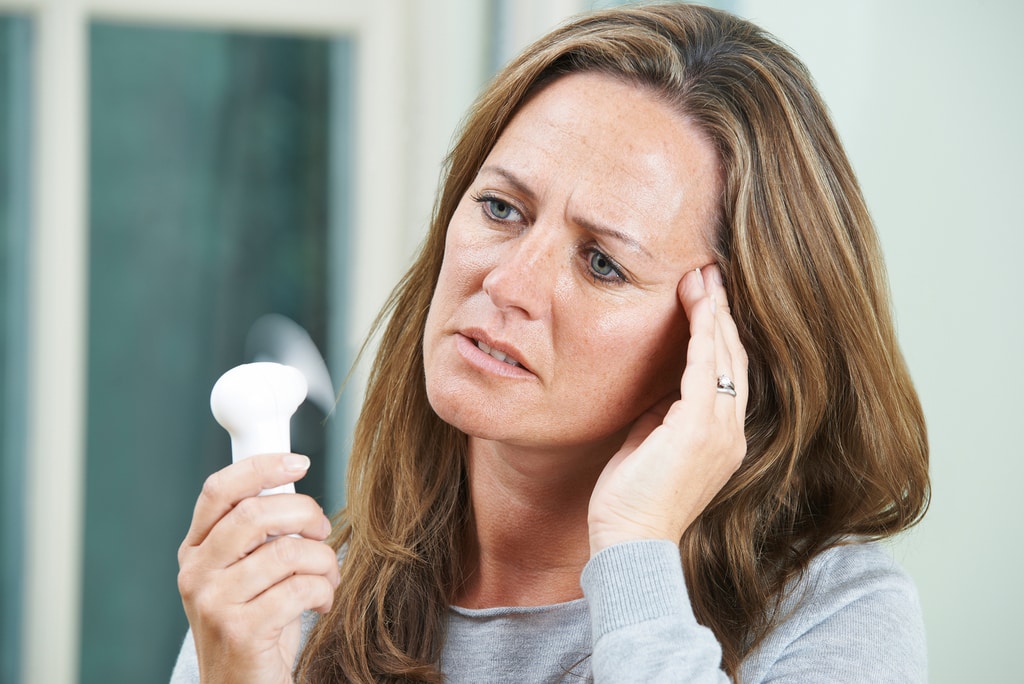What are the 10 Symptoms of Menopause?
You’ve heard it often referred to as simply “the change.” Perhaps you know women who have lamented about hot flashes and night sweats. Menopause is a natural stage in a woman’s life when her menstrual cycle stops. It’s typically diagnosed after you’ve gone 12 months without a period.
But what are the symptoms of menopause starting? We’ve outlined 10 things to watch for, what causes them, and how we can help you with the symptoms of menopause.
What Are the Signs of Menopause Starting?
Typically, you’ll exhibit some of these 10 symptoms of menopause in the months or years leading up to menopause. This time is called perimenopause.
What Are the Symptoms of Menopause? What Menopause Does to a Woman
1. Irregular Periods
This is one of the first signs of menopause starting. It’s very common to skip periods or for periods to skip a month and then return. Cycles may also become shorter, appearing closer together.
However, it’s important to remember that, despite the irregular periods, you can still get pregnant. If you’re not sure whether a missed period is due to menopause or pregnancy, you should take a pregnancy test.
2. Vaginal Dryness
When you’re entering menopause, your body is producing less estrogen. This hormone is responsible for maintaining your vaginal health, and it’s another important sign of menopause starting. Estrogen controls your vagina’s natural lubrication, thickness and elasticity.
When your estrogen levels are reduced, the result is often vaginal dryness or inflammation. We call this condition vaginal atrophy. We would be happy to discuss over the counter and prescription options to treat vaginal dryness and pain with intercourse.
3. What Are the Symptoms of Menopause? Hot Flashes Are Among the Most Common
This is one of the most annoying and troublesome symptoms of menopause. Hot flashes occur because hormonal changes during menopause affect your body’s natural thermostat (called the hypothalamus). This makes you extremely sensitive to even the smallest change in body temperature. The hypothalamus goes into “overdrive” if it thinks your body is too warm. This causes a hot flash.
If hot flashes become a nuisance or a problem, please speak with us. We have solutions that can help.
4. Night Sweats
These are often caused by hot flashes during the night and have a similar root cause as hot flashes.
5. Sleep Issues
Sleep issues may not be foremost on your mind when determining what are the symptoms of menopause, but hot flashes once again play a key part in waking you up several times during the night.
In addition, the reduction in estrogen and progesterone that accompany menopause can also lead to problems such as sleep apnea—in fact those in menopause are three times more likely to have sleep apnea than those who are not.
6. Mood Changes
Estrogen plays a role in producing serotonin, which is a “chemical messenger” neurotransmitter that helps regulate your mood. When changing hormonal levels affect estrogen, serotonin production can be disrupted, leading to mood swings.
7. Chills
Again, you can blame the hypothalamus for this one. Difficulty regulating the body temperature due to hormonal fluctuations can cause chills. You may have heard these referred to as “cold flashes.”
8. Weight Gain and Metabolic Changes
Your body’s metabolism changes due to fluctuating hormones, making many women more likely to gain weight—particularly around the abdomen. It’s also due to the fact that muscle mass diminishes with age while fat increases.
Being overweight or obese puts you at greater risk for several health problems, including Type 2 diabetes, high cholesterol and heart disease. We’re concerned with your overall wellness, and we can tailor a plan to help you keep the weight off—or never gain it—when you enter menopause.
9. Thinning Hair
What causes changes to your hair and skin during menopause? Again, the change in estrogen and progesterone causes hair to not only thin but grow more slowly. In addition, there’s also an increase in the male hormone androgens. These shrink hair follicles.
10. Dry Skin
Changes in hormone levels cause your skin to be thin and dry. However, you can reduce these effects by following a few simple steps:
- Apply sunscreen before going outside—even if you’re only going to be out for a little while
- Have regular skin cancer screenings with a dermatologist; your risk of skin cancer increases with age
- Ask your dermatologist about treatment for age spots
- Regularly perform a skin cancer “self-check”
How Long Does Menopause Last For?
While menopause marks the end of a woman’s reproductive years, the symptoms of menopause can last between four or five years after menopause begins.
What Are The Symptoms of Menopause? We Have the Answers and Solutions You Need
There is relief for hot flashes, night sweats and vaginal irritation that often comes with menopause. Hormone replacement therapy can provide help, although it is not the right choice for everyone. Speak with us and we’ll be more than happy to discuss your treatment options, crafting a plan that is tailored just for you.
For decades, we’ve been women treating women in the Raleigh and Triangle areas. Contact us today to schedule an appointment.




